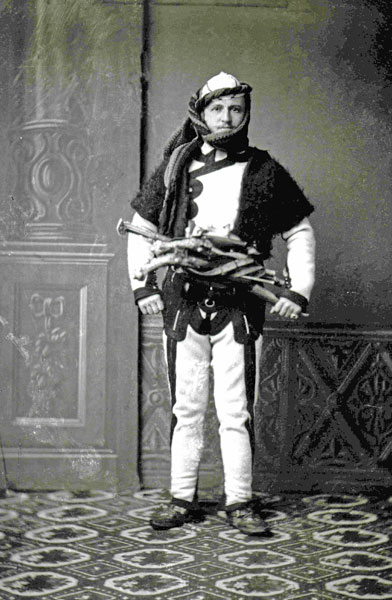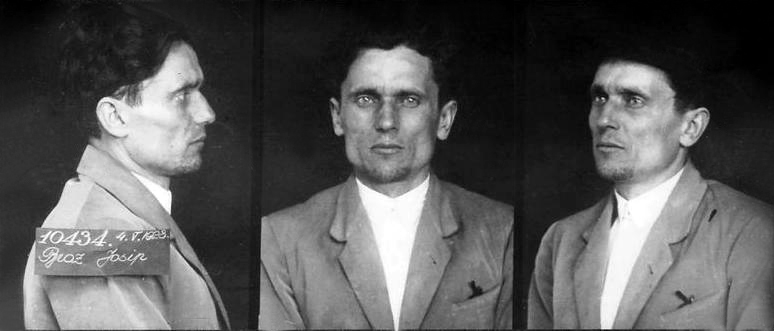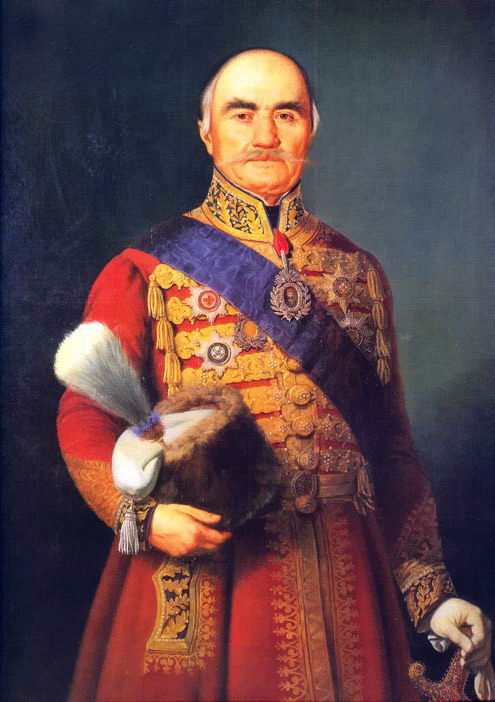|
Insurgency In Kosovo (1995–1998)
The Insurgency in Kosovo began in 1995, following the Dayton Agreement that ended the Bosnian War. In 1996, the Kosovo Liberation Army (KLA) began attacking Serbian governmental buildings and police stations. This insurgency would lead to the more intense Kosovo War in February 1998. Background The Albanian-Serbian conflict has its roots in the expulsion of the Albanians in 1877–1878 from areas that became incorporated into the Principality of Serbia. Animosity between these feuding factions remains strong to this day. The 1950s and 1960s were a period marked by repression and anti Albanian policies in Kosovo under Aleksandar Ranković, a Serbian communist who later fell out and was dismissed by Tito. During this time nationalism for Kosovar Albanians became a conduit to alleviate the conditions of the time. In 1968 Yugoslav Serb officials warned about rising Albanian nationalism and by November unrest and demonstrations by thousands of Albanians followed calling for Kosov ... [...More Info...] [...Related Items...] OR: [Wikipedia] [Google] [Baidu] |
Yugoslav Wars
The Yugoslav Wars were a series of separate but related#Naimark, Naimark (2003), p. xvii. ethnic conflicts, wars of independence, and Insurgency, insurgencies that took place from 1991 to 2001 in what had been the Socialist Federal Republic of Yugoslavia (SFR Yugoslavia). The conflicts both led up to and resulted from the breakup of Yugoslavia, which began in mid-1991, into six independent countries matching the six Republics of Yugoslavia, entities known as republics that had previously constituted Yugoslavia: Slovenia, Croatia, Bosnia and Herzegovina, Montenegro, Serbia, and North Macedonia, Macedonia (now Macedonia naming dispute, called North Macedonia). SFR Yugoslavia's constituent republics declared independence due to rising nationalism. Unresolved tensions between ethnic minorities in the new countries led to the wars. While most of the conflicts ended through peace accords that involved full international recognition of new states, they resulted in a massive number of d ... [...More Info...] [...Related Items...] OR: [Wikipedia] [Google] [Baidu] |
Vlastimir Đorđević
Vlastimir Đorđević (Serbian Cyrillic: Властимир Ђорђевић; born 17 November 1948) is a Serbian former Police of Serbia, police colonel general. For his role in the Kosovo War, he was found guilty of war crimes against Kosovo Albanians before the ICTY. Early life and education Đorđević was born in Koznica, Vladičin Han, Koznica, Vladičin Han, PR Serbia. He graduated from the University of Belgrade Faculty of Law. Career Đorđević was Assistant Minister of the Ministry of Internal Affairs (Serbia), Ministry of Internal Affairs of Serbia, and Chief of the Public Security Department of the Ministry of Internal Affairs. In 1997, Đorđević was promoted from Lieutenant General to Colonel General by presidential decree. He remained the Assistant Minister and Chief of the Public Security Department until January 2001. ICTY trial and sentence He was indicted by the ICTY for being part of the 1999 Serb crackdown on Kosovo Albanians, Kosovo Albanian citizens. As C ... [...More Info...] [...Related Items...] OR: [Wikipedia] [Google] [Baidu] |
1981 Protests In Kosovo
In March and April 1981, a student protest in Pristina, the capital of the then Socialist Autonomous Province of Kosovo, led to widespread protests by Kosovo Albanians demanding more autonomy within the Socialist Federal Republic of Yugoslavia. The Presidency of Yugoslavia declared a state of emergency in Pristina and Kosovska Mitrovica, which led to rioting. The unrest was suppressed by a large police intervention that caused numerous casualties, and a period of political repression followed. Background The University of Pristina was the starting point of the 1981 Kosovo student protests. Kosovo's cultural isolation within Yugoslavia and its endemic underdevelopment, compared to the rest of the country, resulted in the province having the highest ratio of both students and illiterates in Yugoslavia. A university education was not deemed a guarantee of future employment; instead of training students for technical careers, the university specialized in liberal arts, in parti ... [...More Info...] [...Related Items...] OR: [Wikipedia] [Google] [Baidu] |
University Of Pristina (1969–1999)
The University of Pristina was founded in the Socialist Autonomous Province of Kosovo, Socialist Republic of Serbia, Yugoslavia, in the city of Pristina, for the academic year 1969–1970 and functioned until 1999. However, owing to political upheaval, war, successive mutual expulsions of faculty of one ethnicity or the other, and resultant pervasive ethnic-based polarisation, there came to be two disjoint institutions using the same name, albeit idiosyncratically to reflect ethnic identity. Albanian-language activity continues at the original location (University of Pristina), whilst the Serbian-language University of Priština has relocated to North Mitrovica, where it maintains its place within the Serbian education system. History Foundation The first higher education institutions in Kosovo were founded during 1958-69 ( Higher Pedagogical School of Prishtina, Faculty of Philosophy, etc.) and they functioned independently or as part of the University of Belgrade. As the Leag ... [...More Info...] [...Related Items...] OR: [Wikipedia] [Google] [Baidu] |
Albanology
Albanology, also known as Albanian studies, is an interdisciplinary branch of the humanities that addresses the language, costume, literature, art, culture and history of Albanians. Within the studies the scientific methods of literature, linguistics, archeology, history and culture are used. However the Albanian language is the main point of research of the studies. Studies Johann Erich Thunmann in the 18th century was probably the first Albanologist. He supported the theory of the autochthony of the Albanians and also presented the Illyrian origin theory. Later on Gustav Meyer proved that the Albanian language was part of the Indo-European family. In the 20th century such studies were deepened by Norbert Jokl, Milan Šufflay, and Franz Nopcsa von Felső-Szilvás, as well as Karl Reinhold, and Eqrem Çabej. The studies of Albanology were more institutionally supported in Albania starting in 1940 with the opening of the Royal Institute of the Albanian Studies, which had ... [...More Info...] [...Related Items...] OR: [Wikipedia] [Google] [Baidu] |
Socialist Autonomous Province Of Kosovo
The Socialist Autonomous Province of Kosovo, sh-Latn-Cyrl, Socijalistička Autonomna Pokrajina Kosovo, Социјалистичка Аутономна Покрајина Косово, separator=" / "; ; . Also abbreviated as SAP Kosovo. referred to simply as Kosovo, was one of the two autonomous provinces of the Socialist Republic of Serbia within Yugoslavia (the other being Vojvodina), between 1945 and 1990, when it was renamed Autonomous Province of Kosovo and Metohija. Between 1945 and 1963 it was officially named the Autonomous Region of Kosovo and Metohija, with a level of self-government lower than that of the Autonomous Province of Vojvodina. In 1963 it was granted the same level of autonomy as Vojvodina, and accordingly its official name was changed to Autonomous Province of Kosovo and Metohija. In 1968 the term "Metohija" was dropped, and the prefix "Socialist" was added, changing the official name of the province to Socialist Autonomous Province of Kosovo. In 1974 bo ... [...More Info...] [...Related Items...] OR: [Wikipedia] [Google] [Baidu] |
1974 Yugoslav Constitution
The 1974 Yugoslav Constitution was the fourth and final constitution of the Socialist Federal Republic of Yugoslavia. It came into effect on 21 February 1974. With 406 original articles, the 1974 constitution was one of the longest constitutions in the world. It added elaborate language protecting the self-management system from state interference and expanding representation of republics and provinces in all electoral and policy forums. The Constitution called the restructured Federal Assembly the highest expression of the self-management system. Accordingly, it prescribed a complex electoral procedure for that body, beginning with the local labor and political organizations. Those bodies were to elect commune-level assemblies, which then would elect assemblies at province and republic level; finally, the latter groups would elect the members of the two equal components of the Federal Assembly, the Federal Chamber and the Chamber of Republics and Provinces. Although the new ... [...More Info...] [...Related Items...] OR: [Wikipedia] [Google] [Baidu] |
Josip Broz Tito
Josip Broz ( sh-Cyrl, Јосип Броз, ; 7 May 1892 – 4 May 1980), commonly known as Tito ( ; , ), was a Yugoslavia, Yugoslav communist revolutionary and politician who served in various positions of national leadership from 1943 until his death in 1980. During World War II, he led the Yugoslav Partisans, often regarded as the most effective Resistance during World War II, resistance movement in German-occupied Europe. Following Yugoslavia's liberation in 1945, he served as its Prime Minister of Yugoslavia, prime minister from 1945 to 1963, and President of Yugoslavia, president from 1953 until his death in 1980. The political ideology and policies promulgated by Tito are known as Titoism. Tito was born to a Croat father and a Slovene mother in Kumrovec in what was then Austria-Hungary. Drafted into military service, he distinguished himself, becoming the youngest sergeant major in the Austro-Hungarian Army of that time. After being seriously wounded and captured by th ... [...More Info...] [...Related Items...] OR: [Wikipedia] [Google] [Baidu] |
Aleksandar Ranković
Aleksandar Ranković (nom de guerre Marko, nicknamed Leka; sr-Cyrl, Александар Ранковић Лека; 28 November 1909 – 19 August 1983) was a Serbian and Yugoslav communist politician, considered to be the third most powerful man in Yugoslavia after Josip Broz Tito and Edvard Kardelj. Ranković was a proponent of a centralized Yugoslavia and opposed efforts that promoted decentralization that he deemed to be against the interests of the Serbian people;Melissa Katherine Bokovoy, Jill A. Irvine, Carol S. Lilly. State-society relations in Yugoslavia, 1945–1992. Scranton, Pennsylvania, US: Palgrave Macmillan, 1997, p. 295. he ensured Serbs had a strong presence in Serbia's Socialist Autonomous Province of Kosovo's nomenklatura. Ranković cautioned against separatist forces in Kosovo who were commonly suspected of pursuing seditious activities.Independent International Commission on Kosovo. ''The Kosovo report: conflict, international response, lessons learned'' ... [...More Info...] [...Related Items...] OR: [Wikipedia] [Google] [Baidu] |
Principality Of Serbia
The Principality of Serbia () was an autonomous, later sovereign state in the Balkans that came into existence as a result of the Serbian Revolution, which lasted between 1804 and 1817. Its creation was negotiated first through an unwritten agreement between Miloš Obrenović, leader of the Second Serbian Uprising, and Ottoman official Marashli Pasha. It was followed by the series of legal documents published by the Sublime Porte in 1828, 1829 and finally, 1830—the Hatt-i Sharif. Its ''de facto'' independence ensued in 1867, following the evacuation of the remaining Ottoman troops from the Belgrade Fortress and the country; its independence was recognized internationally in 1878 by the Treaty of Berlin. In 1882 the country was elevated to the status of kingdom. Background and establishment The Serbian revolutionary leaders—first Karađorđe and then Miloš Obrenović—succeeded in their goal of liberating Serbia from centuries-long Turkish rule. Turkish authoriti ... [...More Info...] [...Related Items...] OR: [Wikipedia] [Google] [Baidu] |
Expulsion Of The Albanians, 1877–1878
{{disambiguation ...
Expulsion or expelled may refer to: General * Deportation * Ejection (sports) * Eviction * Exile * Expeller pressing * Expulsion (education) * Expulsion from the United States Congress * Extradition * Forced migration * Ostracism * Persona non grata Media * Expelled (film), 2014 teen comedy film * Expelled: No Intelligence Allowed, 2008 film * Expulsion (band), Swedish doom/death metal band * The Expelled, English punk/rock band * The Expulsion (film), a 1923 silent German film * "Expelled" (short story), a 1930 short story by John Cheever * Expelled!, a 2025 video game See also * * * Ejaculation (other) * Ejection (other) * Evicted (other) * Explosion (other) An explosion is a sudden increase in volume and release of energy in an extreme manner. Explosion, Explosive, Explode or Exploder may also refer to: * Explosive material, a substance that can produce an explosion Film * Explosion (1923 film) ... [...More Info...] [...Related Items...] OR: [Wikipedia] [Google] [Baidu] |
Republic Of Serbia (1992–2006)
The Republic of Serbia ( sh-Cyrl-Latn, Република Србија, Republika Srbija, separator=" / ") was a constituent state of the Federal Republic of Yugoslavia between 1992 and 2003 and the Serbia and Montenegro, State Union of Serbia and Montenegro from 2003 to 2006. With Montenegro's secession from the union with Serbia in June 2006, both became sovereign states in their own right for the first time in nearly 88 years. After the League of Communists of Yugoslavia collapsed in 1990, the Socialist Republic of Serbia led by Slobodan Milošević's Socialist Party of Serbia, Socialist Party (formerly the League of Communists of Serbia, Communists) adopted a new constitution, declaring itself a constituent republic with democratic institutions within Yugoslavia, and the "Socialist" adjective was dropped from the official title. As Breakup of Yugoslavia, Yugoslavia broke up, in 1992 Serbia and Montenegro formed a new federative state called the Federal Republic of Yugoslavia, k ... [...More Info...] [...Related Items...] OR: [Wikipedia] [Google] [Baidu] |







